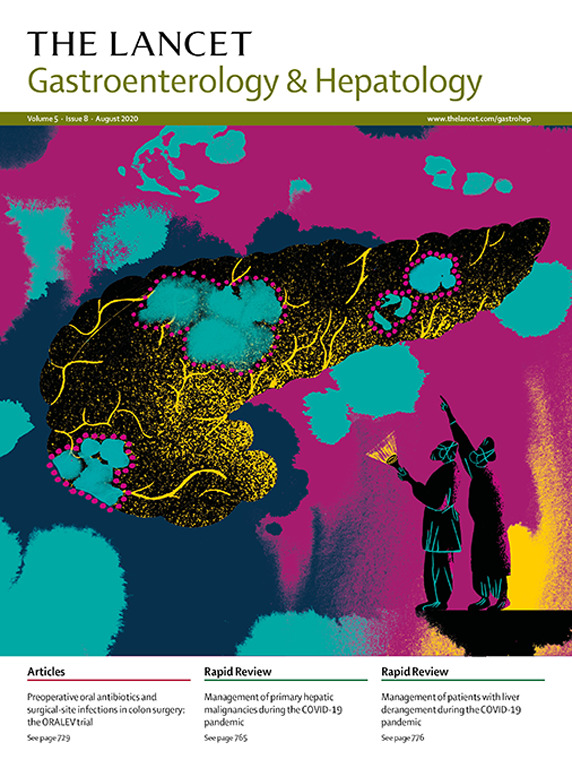Efficacy of dietary interventions in irritable bowel syndrome: a systematic review and network meta-analysis
IF 30.9
1区 医学
Q1 GASTROENTEROLOGY & HEPATOLOGY
引用次数: 0
Abstract
Background
Patients with irritable bowel syndrome (IBS) are often interested in dietary interventions as a means of managing their symptoms. However, the relative efficacy of available diets for the management of IBS is unclear. We aimed to examine the relative efficacy of various dietary interventions in IBS.Methods
For this systematic review and network meta-analysis we searched MEDLINE, EMBASE, EMBASE Classic, and the Cochrane Central Register of Controlled Trials from database inception to Feb 7, 2025, to identify randomised controlled trials comparing an active dietary intervention requiring changes to the intake of more than one food in IBS with either a control intervention, such as a habitual diet, sham diet, a high fermentable oligosaccharides, disaccharides, monosaccharides, and polyols (FODMAP) diet, or alternative miscellaneous dietary advice, or any other active dietary intervention requiring changes to the intake of more than one food. We assessed efficacy using dichotomous assessments of improvement in global IBS symptoms or improvement in individual IBS symptoms, including abdominal pain, abdominal bloating or distension, and bowel habit. We pooled data using a random-effects model, with the efficacy of each intervention reported as pooled relative risks (RRs) with 95% CIs. We ranked interventions according to their P-score, which measures the mean extent of certainty that one intervention is better than another, averaged over all competing interventions.Findings
We identified 28 eligible randomised controlled trials (comprising 2338 patients) of 11 different dietary interventions compared with four control interventions, of which six (low FODMAP diet, British Dietetic Association/National Institute for Health and Care Excellence [BDA/NICE] diet, lactose-reduced diet, starch-reduced and sucrose-reduced diet, a personalised diet, and a Mediterranean diet) were studied in more than one trial. For global IBS symptoms, assessed in 28 randomised controlled trials and when considering only the dietary interventions studied in more than one trial, a starch-reduced and sucrose-reduced diet ranked first (RR of global IBS symptoms not improving 0·41 [95% CI 0·26–0·67]; P-score 0·84; two trials), a low FODMAP diet ranked fourth (0·51 [0·37–0·70]; P-score 0·71; 24 trials), and a BDA/NICE diet ranked tenth (0·62 [0·43–0·90]; P-score 0·44; eight trials), versus a habitual diet. For abdominal pain, assessed in 26 trials and when considering only the dietary interventions studied in more than one randomised controlled trial, a starch-reduced and sucrose-reduced diet ranked second (RR of abdominal pain not improving 0·54 [95% CI 0·33–0·90]; P-score 0·73; two trials), and a low FODMAP diet ranked fifth (0·61 [0·42–0·89]; P-score 0·64; 23 trials), versus a habitual diet. For abdominal bloating or distension, assessed in 26 trials and when considering only the dietary interventions studied in more than one randomised trial, only a low FODMAP diet (RR of abdominal bloating or distension not improving 0·55 [95% CI 0·37–0·80]; P-score 0·64; 23 trials) was superior to a habitual diet and ranked fourth. For bowel habit, assessed in 23 randomised trials, none of the dietary interventions was superior to any of the control interventions, but a low FODMAP diet was superior to a BDA/NICE diet (RR of bowel habit not improving 0·79 [95% CI 0·63–0·99]). All comparisons across the network were rated as low or very low confidence, except for direct comparisons between a low FODMAP diet or a starch-reduced and sucrose-reduced diet and habitual diet, both of which were rated as moderate confidence.Interpretation
In terms of dietary interventions for IBS, the most evidence exists for a low FODMAP diet, but other promising therapies are emerging and should be the subject of further study.Funding
None.饮食干预对肠易激综合征的疗效:系统回顾和网络荟萃分析
肠易激综合征(IBS)患者通常对饮食干预作为控制症状的一种手段感兴趣。然而,现有饮食对肠易激综合征治疗的相对疗效尚不清楚。我们的目的是研究各种饮食干预对肠易激综合征的相对疗效。MethodsFor这个网络系统回顾和荟萃分析我们搜查了MEDLINE, EMBASE, EMBASE经典,和Cochrane中央登记的对照试验数据库《盗梦空间》2月7日,2025年,确定随机对照试验比较活跃的膳食干预需要修改多个食品的摄入量在IBS要么控制干预,如饮食习惯、虚假的饮食,高可发酵的低聚糖,双糖,单糖,和多元醇(FODMAP)饮食,或其他杂项饮食建议,或任何其他需要改变一种以上食物摄入的积极饮食干预。我们采用整体IBS症状改善或个体IBS症状改善的二分法评估疗效,包括腹痛、腹胀或腹胀和排便习惯。我们使用随机效应模型汇总数据,每种干预措施的疗效报告为汇总相对风险(rr), ci为95%。我们根据干预措施的P-score(衡量一种干预措施优于另一种干预措施的平均确定性程度)对所有竞争干预措施进行了排名。我们确定了28项符合条件的随机对照试验(包括2338名患者),涉及11种不同的饮食干预措施,与4种对照干预措施进行了比较,其中6种(低FODMAP饮食、英国饮食协会/国家健康与护理卓越研究所[BDA/NICE]饮食、减少乳糖饮食、减少淀粉和蔗糖饮食、个性化饮食和地中海饮食)在一个以上的试验中进行了研究。在28项随机对照试验中评估的全球IBS症状中,当仅考虑不止一项试验中研究的饮食干预措施时,淀粉减少和蔗糖减少的饮食排名第一(全球IBS症状未改善的RR为0.41 [95% CI 0.26 - 0.67];P-score 0·84;2项试验),低FODMAP日粮排名第4 (0.51 [0.37 ~ 0.70];P-score 0·71;24项试验),BDA/NICE饮食排名第十(0.62 [0.43 - 0.90];P-score 0·44;8项试验),而不是习惯性饮食。对于腹痛,在26项试验中评估,当仅考虑超过一项随机对照试验中研究的饮食干预时,淀粉减少和蔗糖减少的饮食排在第二位(腹痛没有改善的RR为0.54 [95% CI为0.33 - 0.90];P-score 0·73;2项试验),低FODMAP日粮排名第5 (0.61 [0.42 - 0.89];P-score 0·64;23项试验),而不是习惯性饮食。对于腹胀或腹胀,在26项试验中评估,当仅考虑在多个随机试验中研究的饮食干预时,只有低FODMAP饮食(腹胀或腹胀的RR没有改善0.55 [95% CI 0.37 - 0.80];P-score 0·64;23项试验)优于习惯性饮食,排名第四。对于排便习惯,在23项随机试验中评估,没有任何饮食干预优于任何对照干预,但低FODMAP饮食优于BDA/NICE饮食(排便习惯的RR未改善0.79 [95% CI 0.63 - 0.99])。网络上的所有比较都被评为低置信度或极低置信度,除了低FODMAP饮食或淀粉和蔗糖减少饮食与习惯饮食之间的直接比较,两者都被评为中等置信度。在肠易激综合征的饮食干预方面,大多数证据表明低FODMAP饮食是存在的,但其他有希望的治疗方法正在出现,应该是进一步研究的主题。
本文章由计算机程序翻译,如有差异,请以英文原文为准。
求助全文
约1分钟内获得全文
求助全文
来源期刊

Lancet Gastroenterology & Hepatology
Medicine-Hepatology
CiteScore
50.30
自引率
1.10%
发文量
0
期刊介绍:
The Lancet Gastroenterology & Hepatology is an authoritative forum for key opinion leaders across medicine, government, and health systems to influence clinical practice, explore global policy, and inform constructive, positive change worldwide.
The Lancet Gastroenterology & Hepatology publishes papers that reflect the rich variety of ongoing clinical research in these fields, especially in the areas of inflammatory bowel diseases, NAFLD and NASH, functional gastrointestinal disorders, digestive cancers, and viral hepatitis.
 求助内容:
求助内容: 应助结果提醒方式:
应助结果提醒方式:


